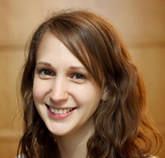Last updated: September 03, 2014
NHGRI welcomes new education and policy fellows
NHGRI welcomes new education and policy fellows
By John Daniels
Assistant Public Affairs Specialist
 |
Elizabeth Tuck, M.A., didn't care much for science growing up. But learning how the X-chromosome affects the color patterns of calico cats during an undergraduate class at Hanover College in Indiana opened her eyes to the world of genetics.
"Understanding the mechanisms of how it works was fascinating to me as a young learner," she said. "I knew I needed to find a way to communicate that to others."
She will explore how to do that as the first fellow in the new Genetics and Education Fellowship, sponsored by the National Human Genome Research Institute (NHGRI) and the American Society of Human Genetics (ASHG). Because genomics is becoming increasingly important in people's everyday lives, the fellowship seeks to develop leaders in genetic and genomic literacy and education.
Ms. Tuck will begin the 16-month fellowship, in September 2014, at ASHG. There, she will participate in educational research and program development for a variety of audiences. In early 2015, she will rotate to NHGRI's Education and Community Involvement Branch (ECIB), within the Division of Policy, Communications and Education (DPCE), and participate in the branch's activities. Later in 2015, she will complete the fellowship with a rotation in an organization, of her choice, that is dedicated to science education.
"This is a great opportunity for her to establish herself in the field of genetic and genomics education," ECIB Chief Vence Bonham, Jr., J.D., said. "Because we continually engage communities nationwide, we're in a position to help her do that, and it's our responsibility to do so."
Ms. Tuck has a master's degree in molecular cell biology from Washington University in St. Louis (WUSTL). While in graduate school, her research focused on using exome sequencing, and other techniques, to understand the molecular mechanisms of various neurological diseases, such as amyotrophic lateral sclerosis (ALS) and Charcot-Marie-Tooth disease.
At WUSTL, she was a laboratory teaching assistant and mentored undergraduate and graduate students. She also taught extracurricular biology classes for underserved youth at the Saint Louis Science Center.
Most recently, she taught high school biology and genetics at The Wellington School in Columbus, Ohio. "Being a teacher allowed me to approach teaching students in a new way because I could see how my students were growing from the beginning of the year to the end of the year," she said.
Though she enjoyed those experiences, she dreams of having a career in which she can impact students on a larger scale.
"As a teacher, you can only reach 30 students at a time," Ms. Tuck said. "I want to go beyond the scope of my classroom walls, and this fellowship is an opportunity to do so."
 |
The Genetics and Education Fellowship is modeled on the existing Genetics and Public Policy Fellowship, which will be hosting its 13th fellow, Katherine Blizinsky, Ph.D.
Dr. Blizinsky recently earned her doctoral degree in neuroscience from Northwestern University Feinberg School of Medicine in Chicago. Her research focused on the genetic basis of various psychiatric and neurological diseases such as schizophrenia, autism and Alzheimer's disease.
Her interest in genomics came from a unique and life-changing opportunity to work as a researcher on the Human Genome Project when she was a 16-year-old high school student. To fulfill an educational requirement, she was enrolled in a health class at Garfield High School in Seattle, Washington, but she wasn't feeling challenged.
At her request, the school administration allowed her to work in a University of Washington laboratory to fulfill the requirement. There, researchers like Leroy Hood, M.D., Ph.D., who invented the automated DNA sequencer, mentored her and allowed her to actively participate in groundbreaking research.
"They didn't treat me like a 16-year-old high school student. They treated me like a budding scientist," Dr. Blizinsky said. "I bonded with genetics for life."
As she matriculated through her graduate career, she developed her interest in science policy. She co-founded Science Policy Initiative Northwestern (SPiN), a campus organization dedicated to education and discourse around science policy. Her involvement with the organization sparked her interest in open science and collaborative research.
Dr. Blizinsky says she wants to use her career to advocate for policies that will help genomics research reach its fullest potential.
"Genomics has shifted toward a need for more collaboration and data sharing," she said. "My career goal is to help this transition take place, and this fellowship will help me find the best way to do so."
During the fellowship, Dr. Blizinsky will attend congressional hearings, track legislation and science policy issues, craft policy position statements and analyze the impact and implications of genomics policy.
In September 2014, she will begin the fellowship in DPCE's Policy and Program Analysis Branch (PPAB), and in early 2015 she will work as a staff member in a Congressional office or on a Congressional committee. Later in 2015, she will complete the last portion of the fellowship at ASHG, where she will support its involvement in legislative and policy issues.
"Dr. Blizinsky has a keen interest in policy," said PPAB Chief Derek Scholes, Ph.D. "This fellowship will help her gain a range of experiences, demonstrate her capabilities, make the necessary contacts and find a policy-related position at the end of the fellowship."
"We're very pleased to support the career development of these future leaders," said Laura Lyman Rodriguez, Ph.D., director of DPCE. "As they navigate the challenges and opportunities of working in science policy and education, they will become great contributors to our institute's mission and to the field of genomics."
To learn more about the Genetics and Education Fellowship, visit: www.genome.gov/27556152/genetics-education-and-engagement-fellowship/
To learn more about the Genetics and Public Policy Fellowship, visit: www.genome.gov/10003979/genetics-and-public-policy-fellowship/
Posted: September 3, 2014
